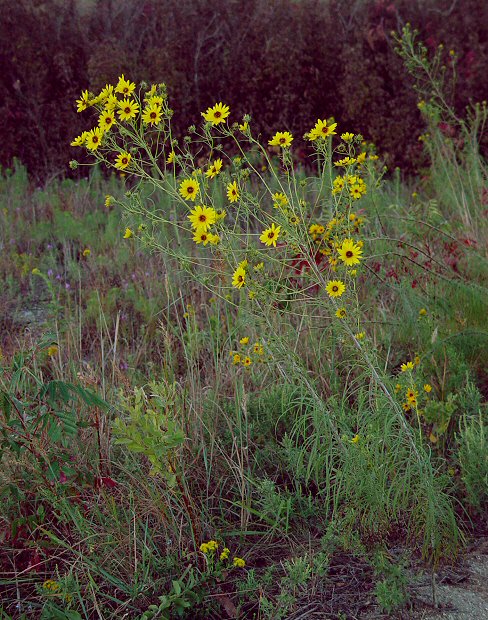Helianthus salicifolius A. Dietr.
Willow-Leaved Sunflower

Native
CC = 8
CW = 5
MOC = 8
© SRTurner
Helianthus salicifolius A. Dietr.Willow-Leaved Sunflower | |
 |
Native CC = 8 CW = 5 MOC = 8 |
© SRTurner |
|
Family - Asteraceae/Heliantheae Habit - Perennial forb, with long-creeping, branched rhizomes, often occurring as colonies of stems. Stems - Ascending to erect, to 2.5 m, not densely clumped, glabrous, terete, often somewhat glaucous.
Leaves - Mostly alternate, simple, sessile, numerous (sometimes appearing in irregular fascicles) and well developed along the stem (usually many more than 30 nodes), often appearing arched or drooping. Blades of the stem leaves 4-20 cm long, 0.1-1.0 cm wide, linear or those of the lowermost leaves sometimes narrowly lanceolate (mostly 12-20 times as long as wide), not folded longitudinally, tapered at the base, tapered to a sharply pointed tip, the margins entire, mostly curled under, the surfaces glabrous or sparsely pubescent with minute, slender, soft, appressed hairs, also with moderate to dense, sessile, yellow to brown glands, with 1 main vein.
Inflorescences - Solitary terminal heads, or more commonly appearing as open, few-headed clusters or open panicles, the heads mostly long-stalked. Peduncles glabrous, with a few reduced bracts, 5-20 cm long.
Heads - Involucre 9-14 mm long, 10-18 mm in diameter, mostly extending beyond the tips of the disc corollas, the bracts in 2 or 3 subequal series, narrowly lanceolate to nearly linear, tapered to a sharply pointed, slender, loosely ascending to more commonly spreading or recurved tip, the margins with a dense fringe of short hairs, the surfaces glabrous or inconspicuously and minutely hairy and often also with scattered, sessile, yellow glands, viscid externally. Receptacle shallowly convex, the chaffy bracts 6-9 mm long, oblong-oblanceolate, tapered to a sharply pointed, green, minutely hairy tip, the outer surface also minutely hairy.
Flowers - Ray florets sterile, 10-21, the corolla 2.5-3.5 cm long, glabrous, yellow. Disc florets perfect, the corolla 5-6 mm long, the lobes and sometimes also the tip of the tube reddish brown to dark purple above a yellow basal portion, the 5 stamens adnate at the base of the corolla tube, the filaments yellow, glabrous, 2-3mm long, the anthers 3-4mm long, mostly exserted, connate around the style and stigma, the styles bifurcate at the apex, mostly glabrous but pubescent on the stigmas, yellow. Pappus of 2 scales 3.0-3.5 mm long, these oblong-lanceolate, tapered abruptly to a sharply pointed, minutely awnlike tip, often with an additional pair of thin, irregular apical lobes, also usually with 2-6 additional minute, oblong scales 0.2-0.5 mm long.
Fruits - Achenes 4-6 mm long, narrowly wedge-shaped, flattened but 4-angled in cross-section, the surface glabrous, often finely mottled with dark brown and lighter brown patches. Flowering - August - October. Habitat - Upland prairies, limestone glades, roadsides. Origin - Native to the U.S. Other info. - This attractive species can be found in a handful of western Missouri counties. It is more common just to our west, in the eastern half of Kansas, but overall its range is relatively small. The plant is easy to identify because of its numerous, very narrow, arched leaves. The leaves are congested at the middle of the stem at anthesis. Photographs taken at Tall Grass Prairie National Preserve, KS., 9-18-06 (DETenaglia); and near Olathe, Johnson County, KS, 9-5-2024 (SRTurner). |